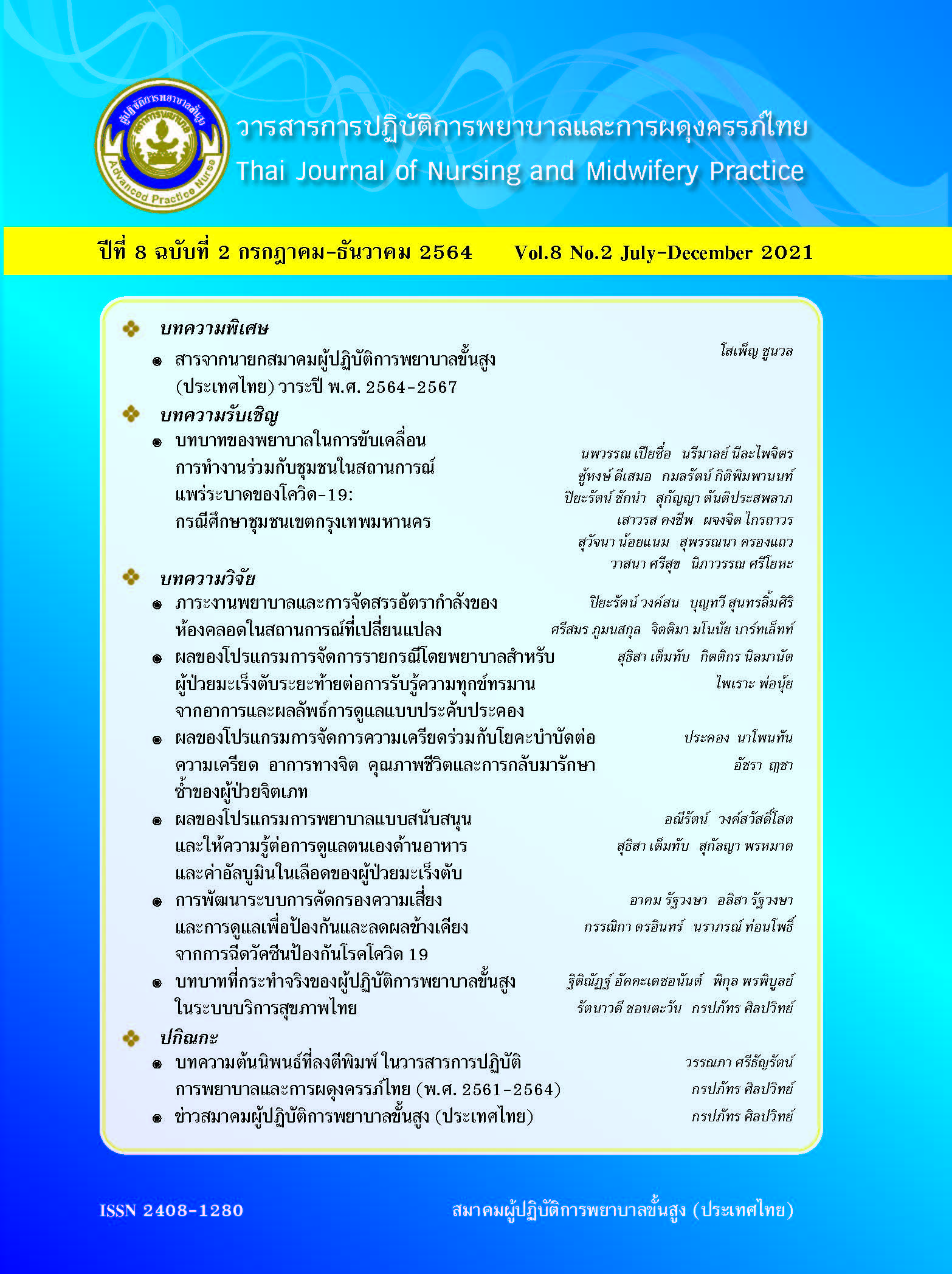Effects of Nurse Case Management Program for Patients with Terminal Stage Hepatocellular Carcinoma on Perception of Symptom Induced Suffering and Palliative Care Outcome
Main Article Content
Abstract
Patients with terminal stage hepatocellular carcinoma suffers both physically and mentally. Nurse case management can help alleviate the suffering of terminal stage patients. This quasi-experimental research with one - group pretest-posttest design aimed to determine the effects of a nurse case management program on perception of symptom induced suffering and palliative care outcomes among patients with terminal stage hepatocellular carcinoma. The sample was 36 patients with terminal stage hepatocellular carcinoma who were admitted to a medical ward of a tertiary hospital. The 5-day program composed of 5 stages: (1) identifying and selecting the target patients; (2) assessing and examining the problems; (3) planning case-based care; (4) implementing the care plan; and (5) evaluating the outcomes. Research instruments consisted of: 1) the Thai version of the Edmonton Symptom Assessment; and 2) the Thai version of the Palliative Care Outcome Scale. The Cronbach, s alpha reliability of the instruments were 0.78 and 0.75, respectively. The data were analyzed using paired t-test. Results revealed that after the program: (1) the mean score of the perception of symptom-induced suffering after receiving the program statistically significant lower than before receiving the program (t = 10.49, p < 0.001); and (2) the mean score of the perception of palliative care outcomes after receiving the program statistically significant lower than before receiving the program (t =17.90, p < 0.001). The nurse case management program could help improve the perception of symptom-induced suffering of the patients with terminal stage hepatocellular carcinoma. Further study should be done in a larger sample and with longer period.
Downloads
Article Details

This work is licensed under a Creative Commons Attribution-NonCommercial-NoDerivatives 4.0 International License.
References
Mokdad AH, Dwyer-Lindgren L, Fitzmaurice C, Stubbs RW, Bertozzi-Villa A, Morozoff C, et al. Trends and patterns of disparities in cancer mortality among US counties, 1980-2014. JAMA 2017; 317(4):388-406.
Kumar M, Panda D. Role of supportive care for terminal stage hepatocellular carcinoma. J Clin Exp Hepatol 2014;4(Suppl 3):130-9.
Somboon K, Siramolpiwat S, Vilaichone RK. Epidemiology and survival of hepatocellular carcinoma in the central region of Thailand. Asian Pac J Cancer Prev 2014;15(8):3567-70.
Brennan F. Palliative care as an international human right. J Pain Symptom Manage 2007;33(5): 494-9.
World Health Organization . Integrating palliative care and symptom relief into primary health care: a WHO guide for planners, implementers and managers. [Internet]. 2018 [cited 2020 March 10]. Available from https://apps.who.int/iris/handle/10665/274559.
Pairojkul S. Importance of service system development palliative care. In: Nagaviroj K, editor. Terminal ill care and family. Bangkok: Association for the Terminal Ill Care Workers;2016.p.3-8. (In Thai)
Luckett T, Phillips J, Agar M, Virdun C, Green A, Davidson PM. Elements of effective palliative care models: a rapid review. BMC Health Serv Res 2014;14:136. doi:10.1186/1472-6963-14-136
Utthiya P, Amnatsatsue K, Kedmongkol P, Chansriwong C. Effects of case management program for older adults with end stage cancer in the community. J Public Health 2018;48(3):371-84. (In Thai)
Nilmanat K, Sae-Chit K. Effects of a case-based management nursing programme for terminally ill patients on their perception of symptom-induced suffering and terminal care quality. Thai J Nurs Council 2018;33(3):52-66.(In Thai)
Nantachaipan P. Case management in the care for patients at the end of life. Nurs J 2015; 42(1):153-8. (In Thai)
Thomas RE, Wilson DM, Birch S, Woytowich B. Examining end-of-life case management: systematic review. Nurs Res Pract 2014;2014:651681. doi:10.1155/2014/651681
Lemeslow S, Hosmer WD, Klar J, Lwanga KS. Adequacy of sample size in health studies. [Internet]. 1990 John wiley & Sons Ltd: England [cited 2018 March 15]. Available from http://apps.who.int/iris/bitstream/10665/41607/1/0471925179_eng.pdf
Chewaskulyong B, Sapinun L, Downing GM, Intaratat P, Lesperance M, Leautrakul, S, et al. Reliability and validity of the Thai translation (Thai PPS Adult Suandok) of the Palliative Performance Scale (PPSv2). J Palliat Med 2012;26(8):1034-41.
Watanabe SM, Nekolaichuk C, Beaumont C, Johnson L, Myers J, Strasser F. A multicenter study comparing two numerical versions of the Edmonton Symptom Assessment System in palliative care patients. J Pain Symptom Manage 2011;41(2):456-68.
Hearn J, Higginson IJ. Development and validation of a core outcome measure for palliative care: the palliative care outcome scale. Palliative Care Core Audit Project Advisory Group. Qual Health Care 1999;8(4): 219-27.
Anseekaew P, Matchim Y, Ratanabunjerdkul H. The effects of an end of life care program on the Palliative Care Outcome and perceived peaceful end of life among end stage cancer patients. J Royal Thai Army Nurs 2020;21(2):315-22. (In Thai)
Nakawiro P. The palliative care outcome in palliative cancer patients in Phra Nakhon Si Ayutthaya Hospital. J Preven Med Society Thailand 2017;7(1): 11-22. (In Thai)


